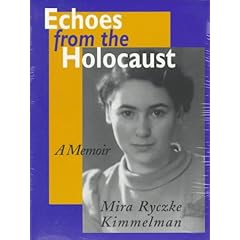Wax is an odd last name. I don’t run into Waxes every day. Generally, the only time I meet other Waxes is at family reunions. For those who might wonder where the name comes from, it appears the Wax name has some sort of Jewish origin. (In fact, I have come across several Rabbi Waxes!)
Not too long ago, I started wondering how many people with the last name WAX perished in the Holocaust. I looked up a website that documented the names of Holocaust victims. I entered my last name into the Search field and quickly discovered that (counting the ethnic variations of my last name) the number of results was too large to be displayed. I had to refine my search based on location. Thousands upon thousands of Waxes died in the Holocaust.
Even though I am not Jewish and do not have (to my knowledge) any direct relatives who died in the Holocaust, I cannot help but feel a kinship with the people whose names occupy the long list of victims. These were real people – people who shared my family name. And so the horror of the Holocaust hits home.
Echoes from the Holocaust: A Memoir (1997, University of Tennessee Press) tells the story of Mira Ryczke Kimmelman. Mira’s story is, like most Holocaust memoirs, a heart-wrenching account of loss and survival. She writes with an eye to detail – using vivid imagery to accentuate the beauty of life and the horror of death.
Echoes from the Holocaust is not primarily about the death camps; it is about surviving with human dignity intact. Mira’s narration makes for a gripping story – one that begins with her early life in Poland and ends with her readjustment into society and her eventual immigration to America. The middle part of the book tells the story of the concentration camps and stands as a testament to Mira’s will to survive.
What differentiates this story from other books on the Holocaust is Mira’s lack of bitterness. Mira does not appear to harbor any hostility towards those who abused her. Of course, she never excuses the horrible behavior of the Nazis. Twenty members of Mira’s immediate family perished in the Holocaust. But what impressed me most about this book was the fact that Mira does not tell the story out of bitterness or rage, but out of deep sadness and a sense of responsibility that these stories need to be told.
The enormity of human evil portrayed in this book will shake you to the core.
“Because of Auschwitz, the world will never be the same. Auschwitz was absolute evil and a warning of what mankind is capable of doing.” (58)
Likewise, there is a sense that evil leaves a mark that can never be fully erased.
“The scars of war I shall bear for the rest of my life.” (92)
Even as Mira recounts her post-Holocaust experienes, an underlying sadness lingers throughout the rest of the book. She questions her father’s optimism that kept them from seeking asylum until it was too late. She finds love and laughter in her husband and children. But she also deals with survivor’s guilt, especially when she talks about her brother. Why did she survive? Why did he die?
Echoes from the Holocaust: A Memoir serves as a warning to us today. The heart of man is desperately wicked. There is no end to the evil schemes that we can dream up and put into action. That is why it is important to hear the stories of those who have seen the capacity of human sinfulness in its darkest form. We must remember.
“Only by remembering the bitter lesson of Hitler’s legacy can we hope it will never be repeated. Teach it, tell it, read it.” (165)



















